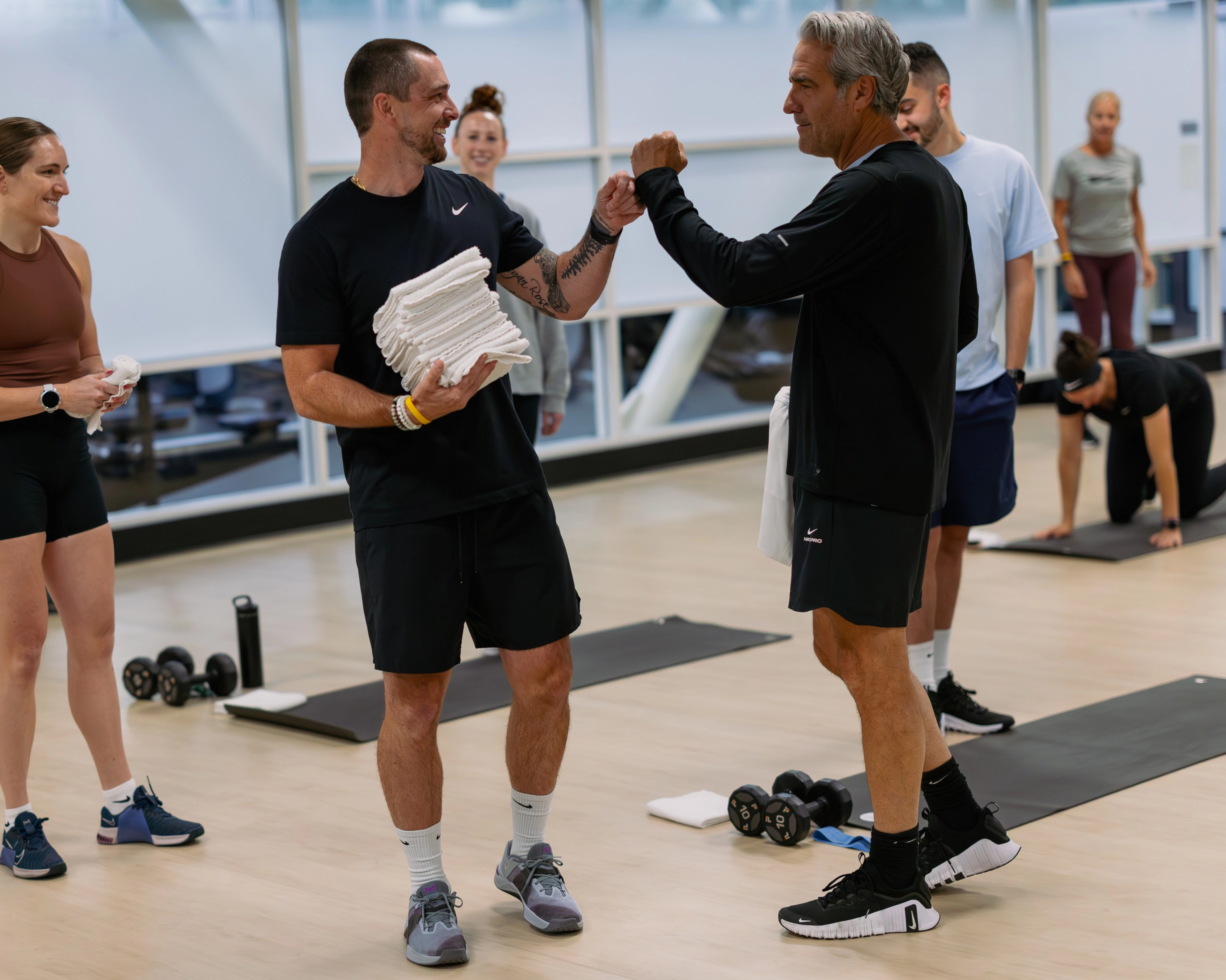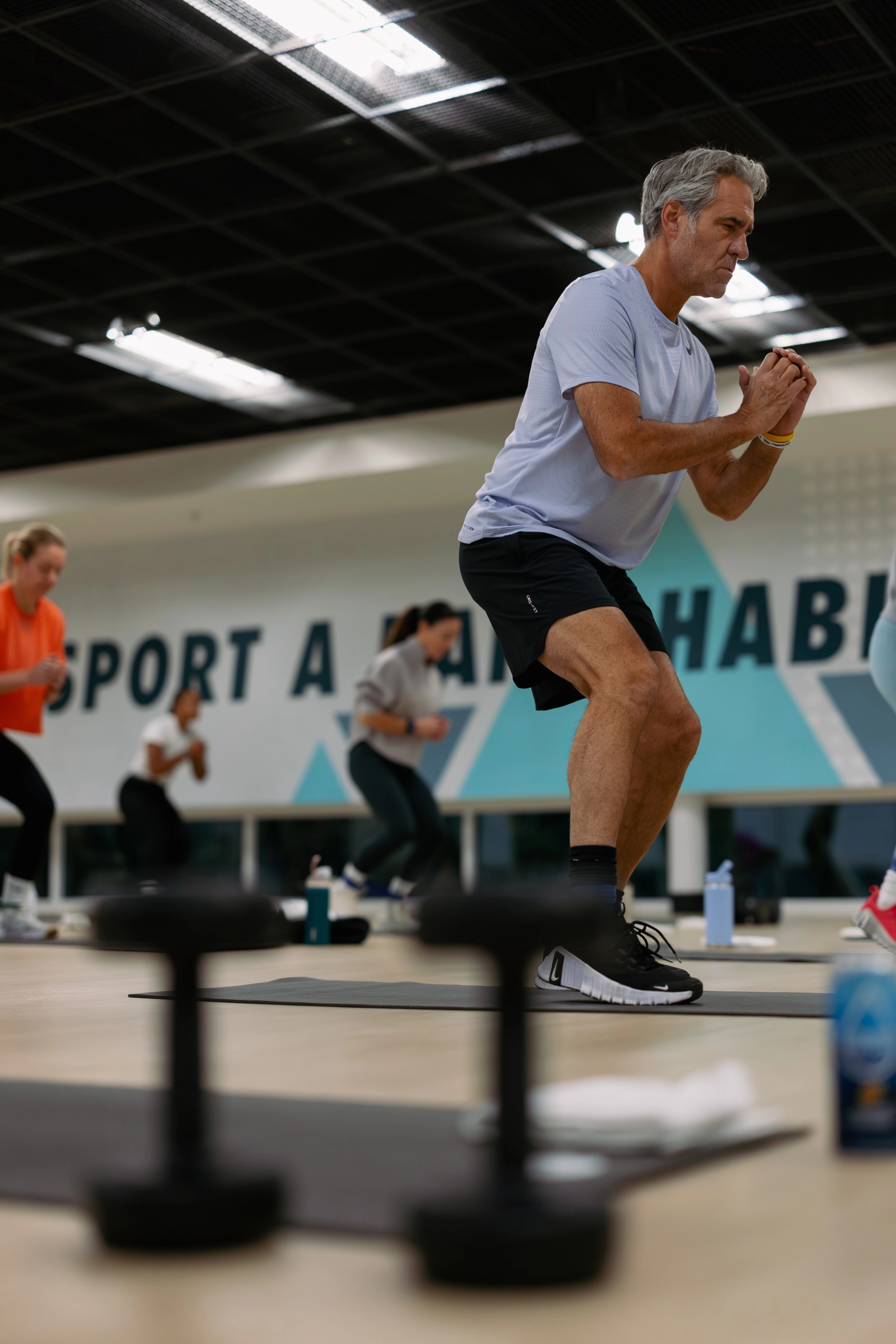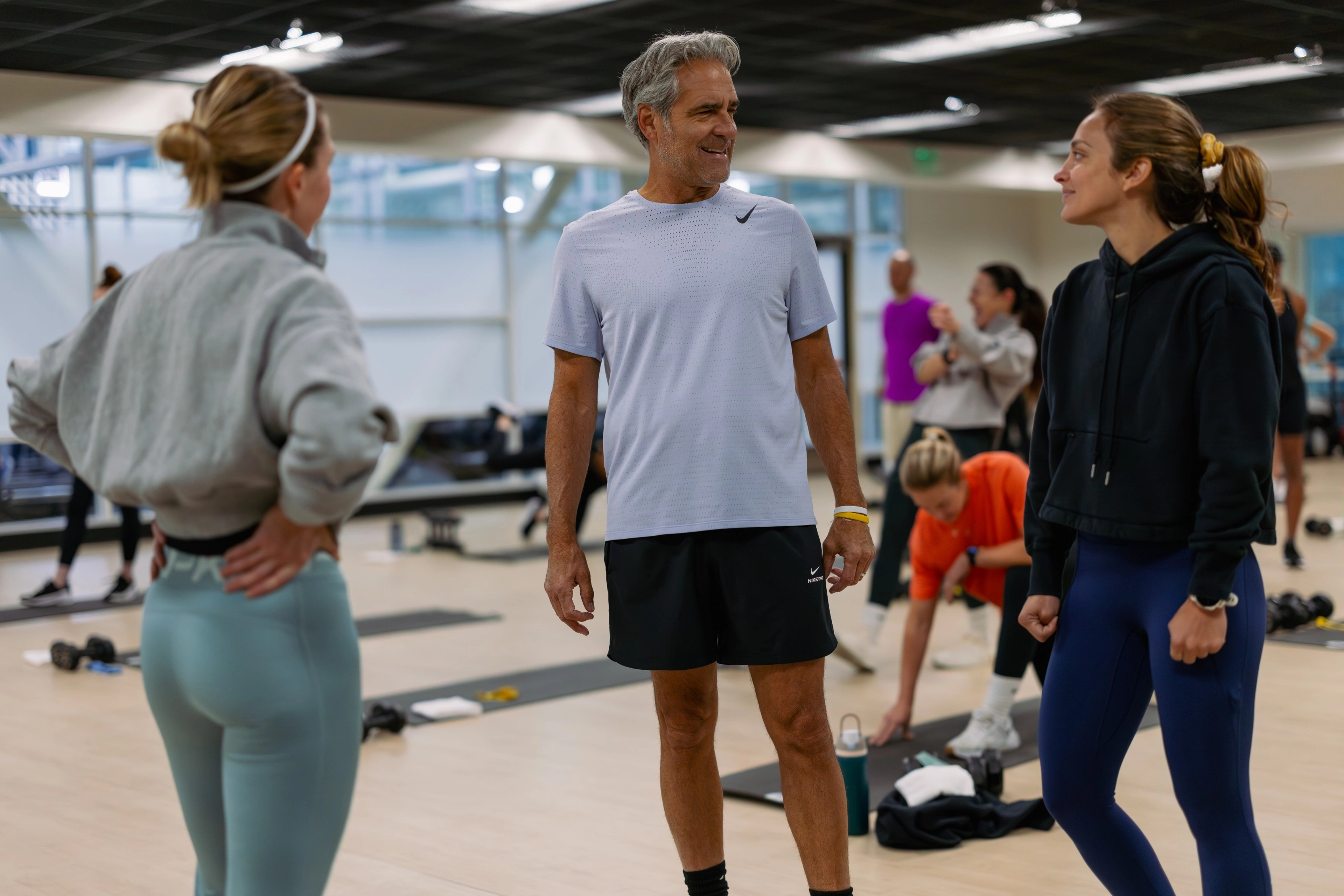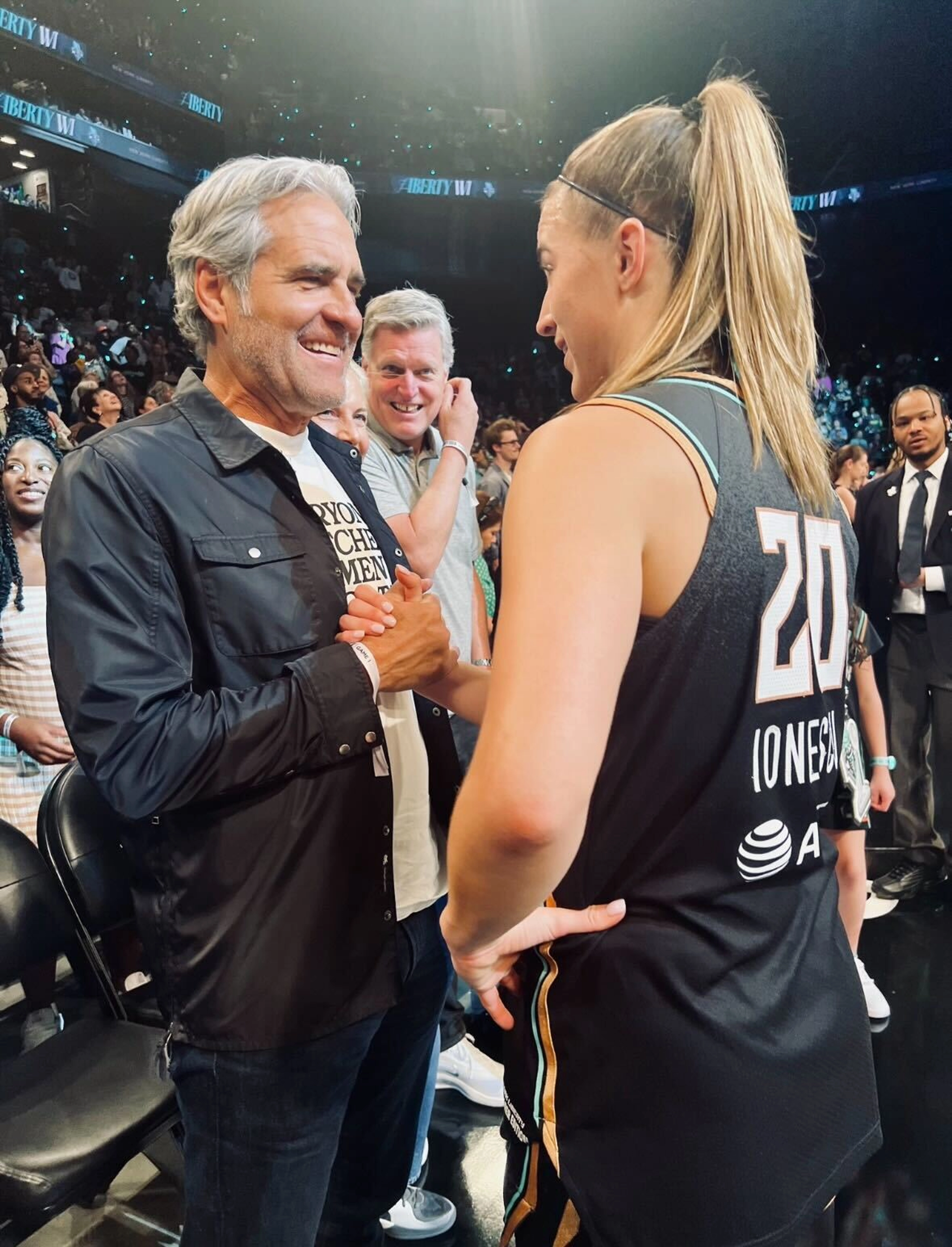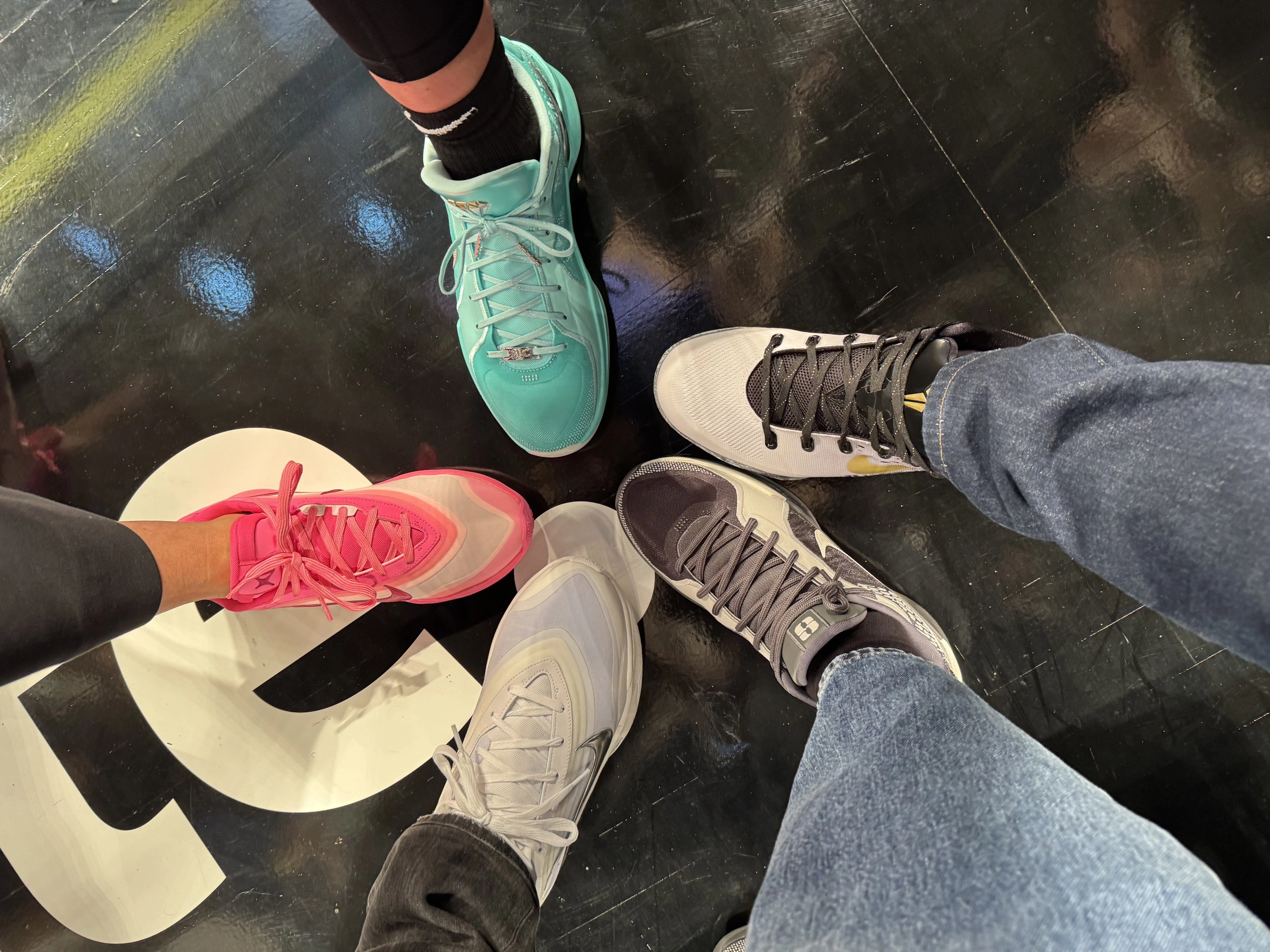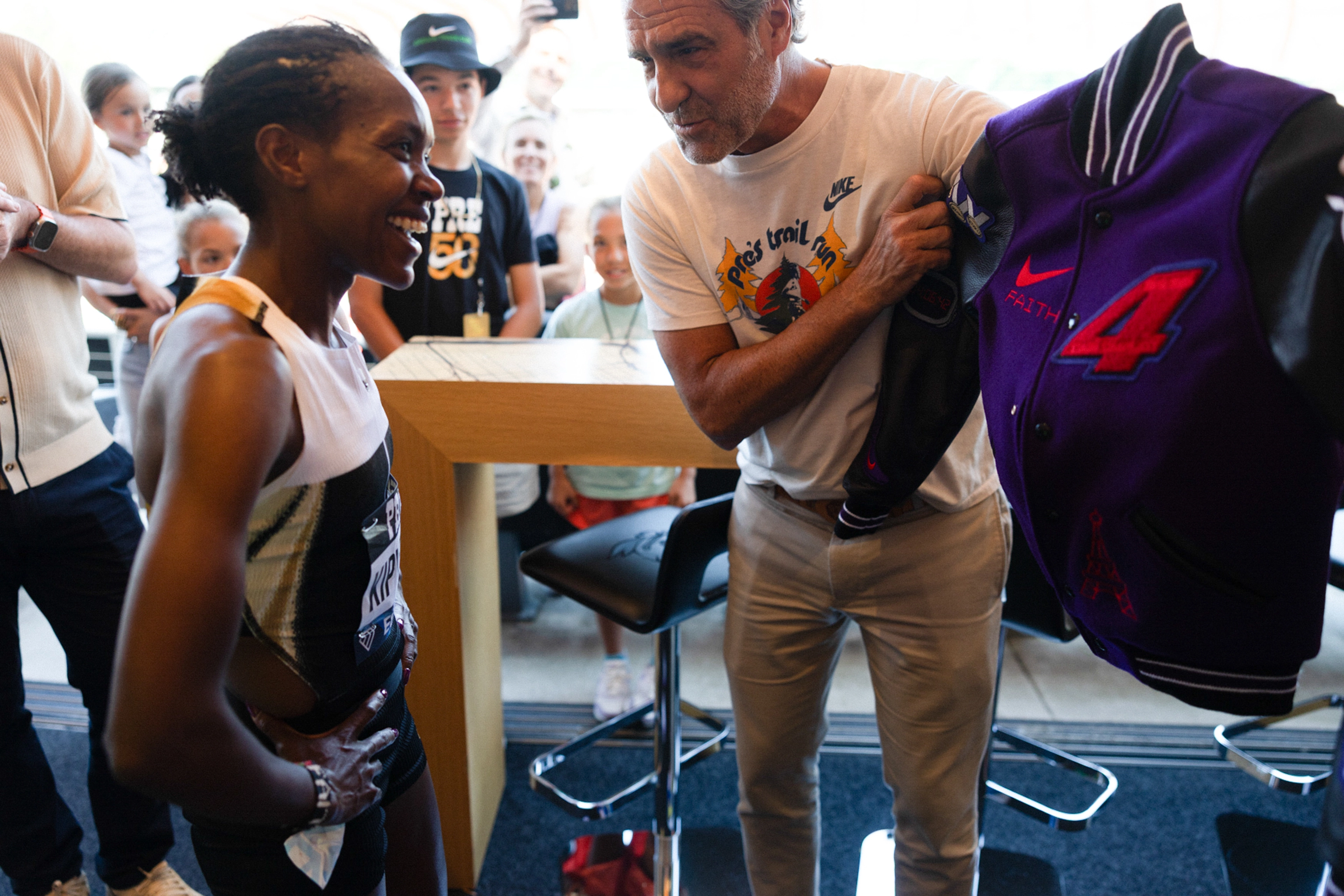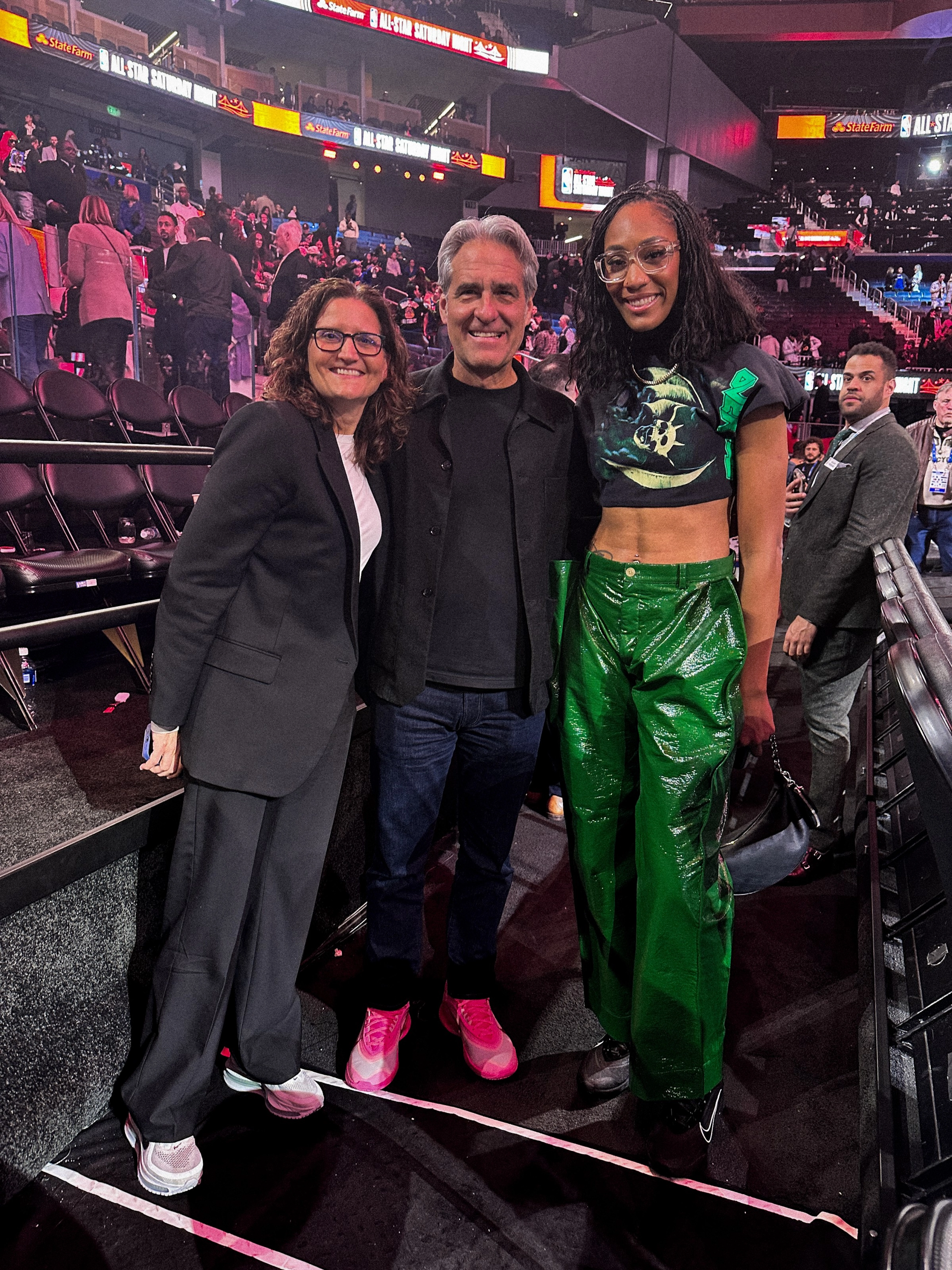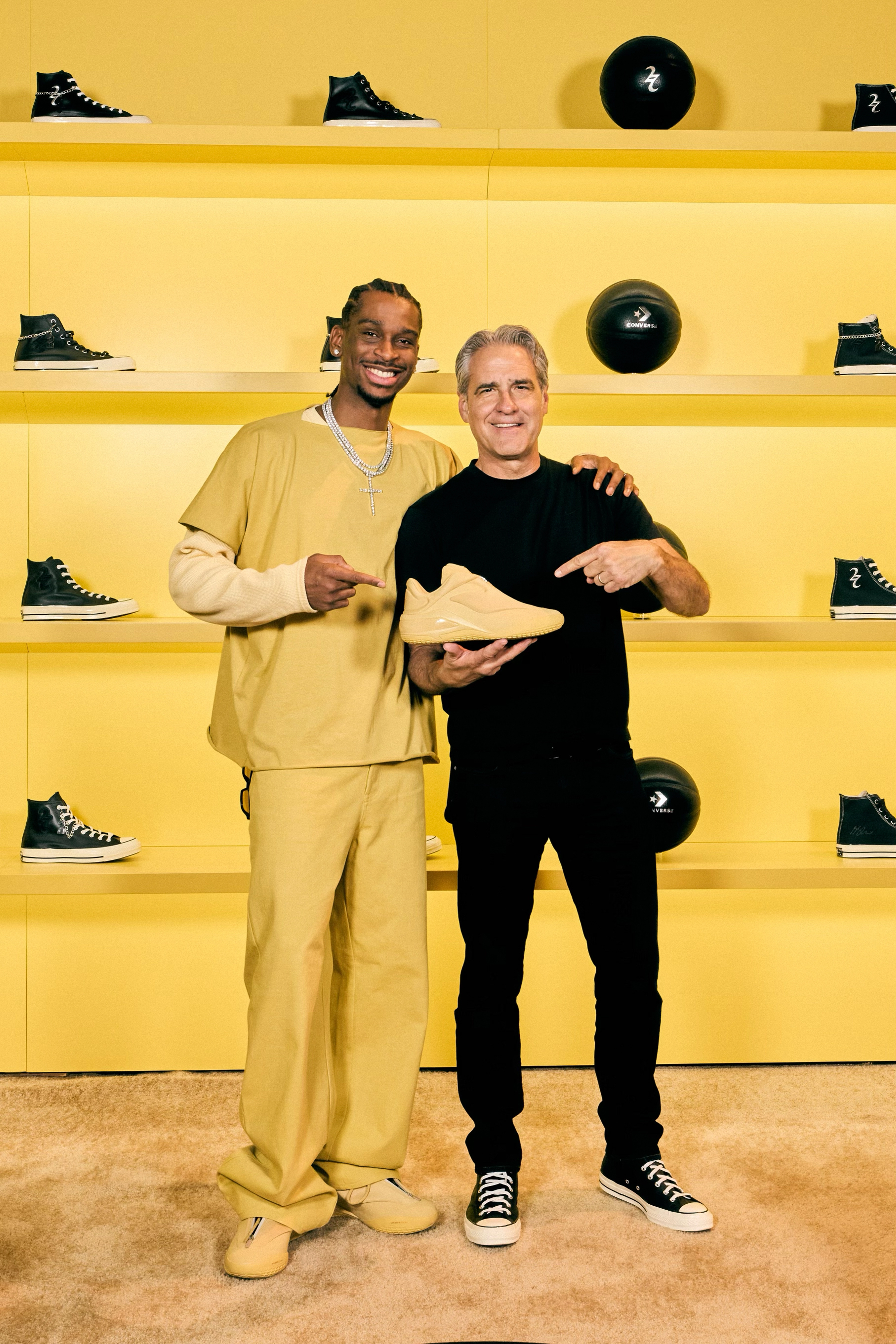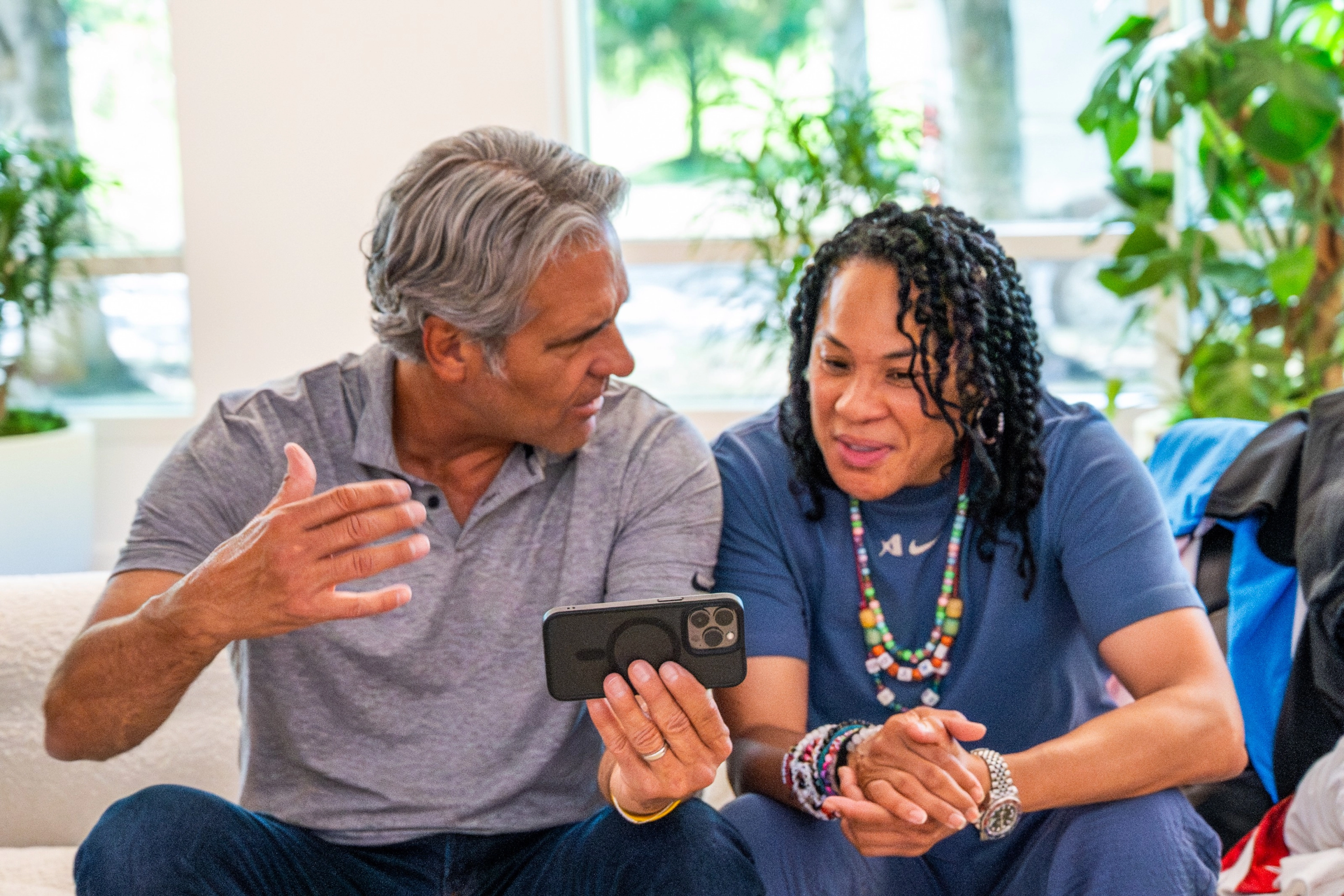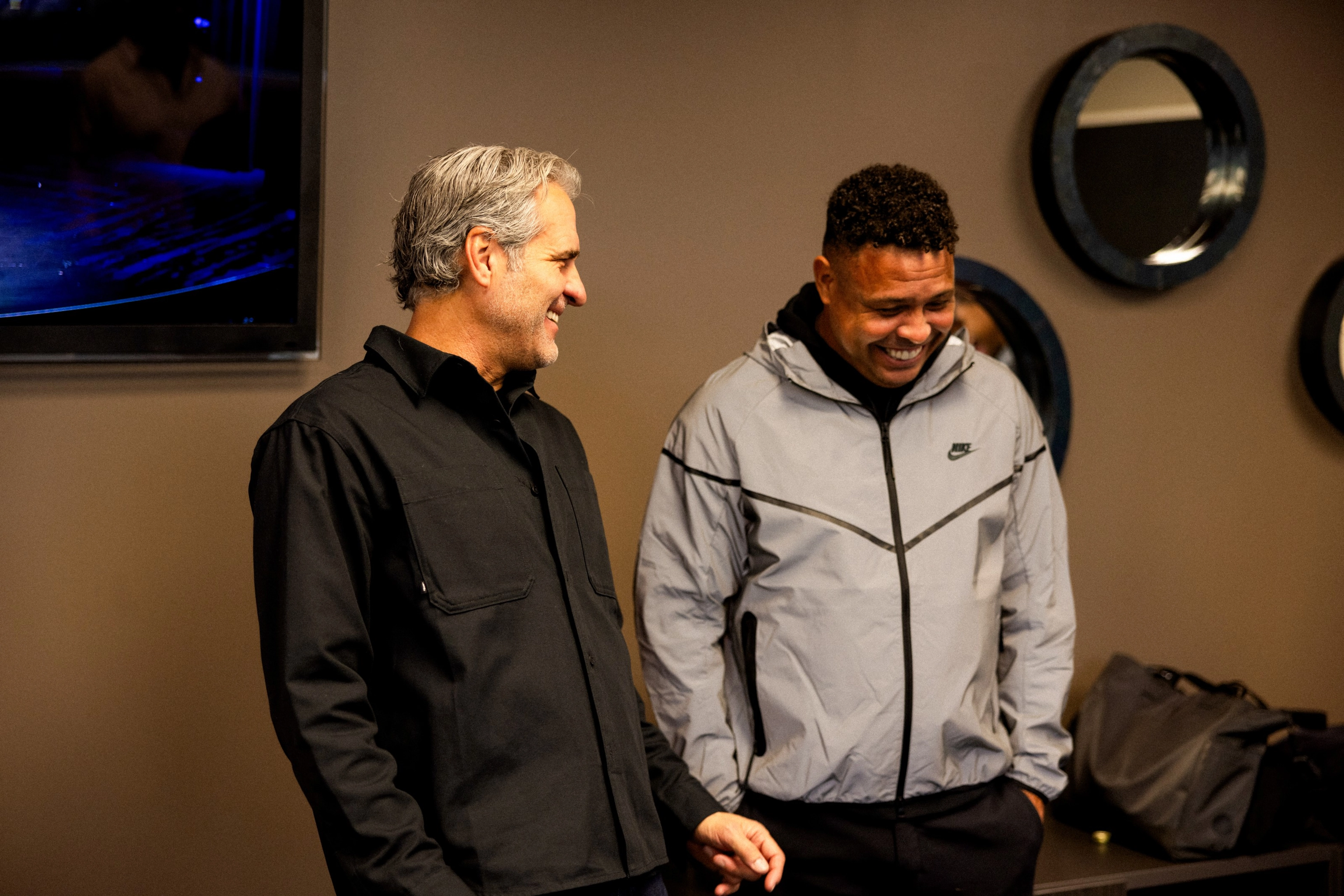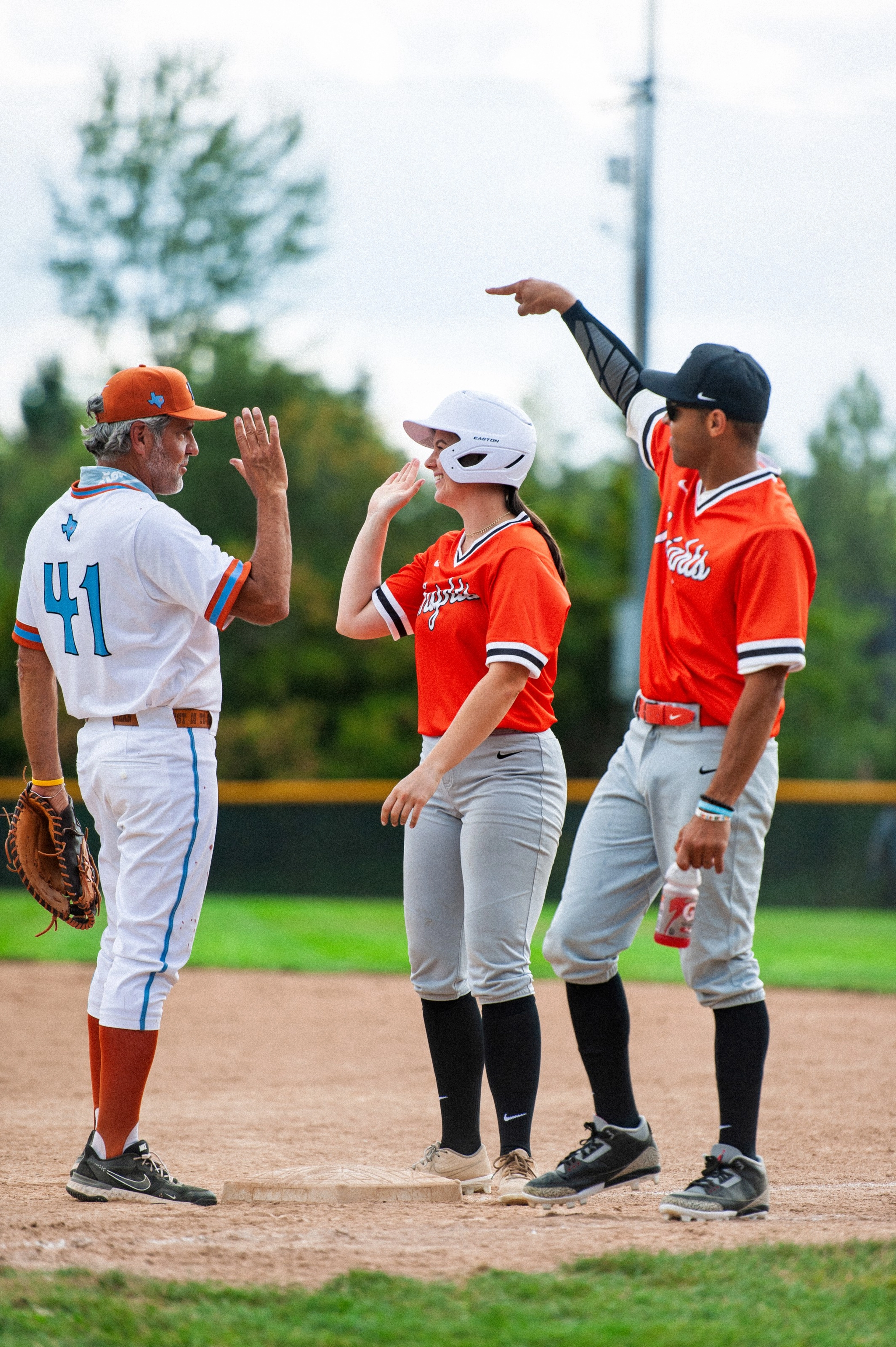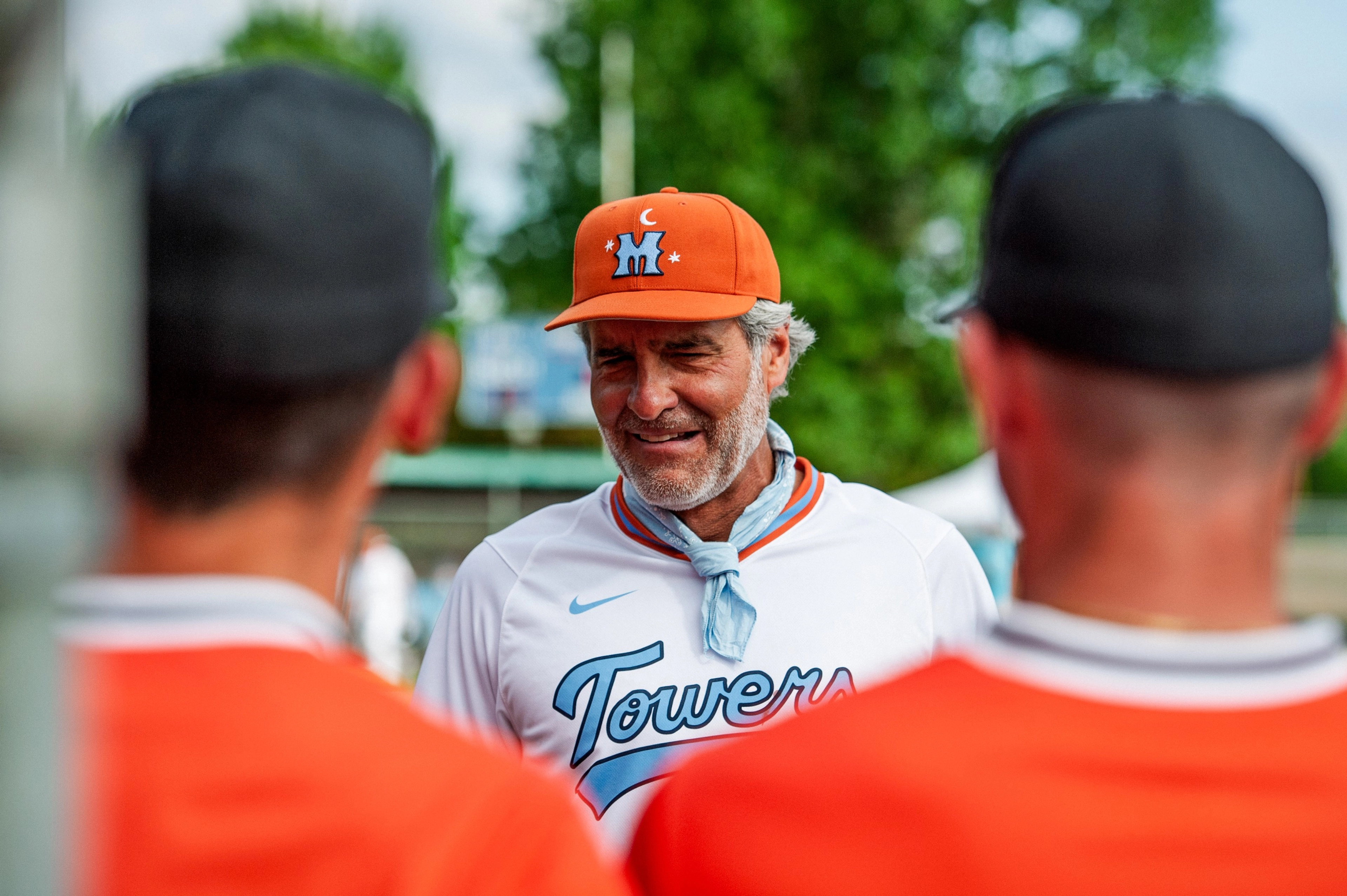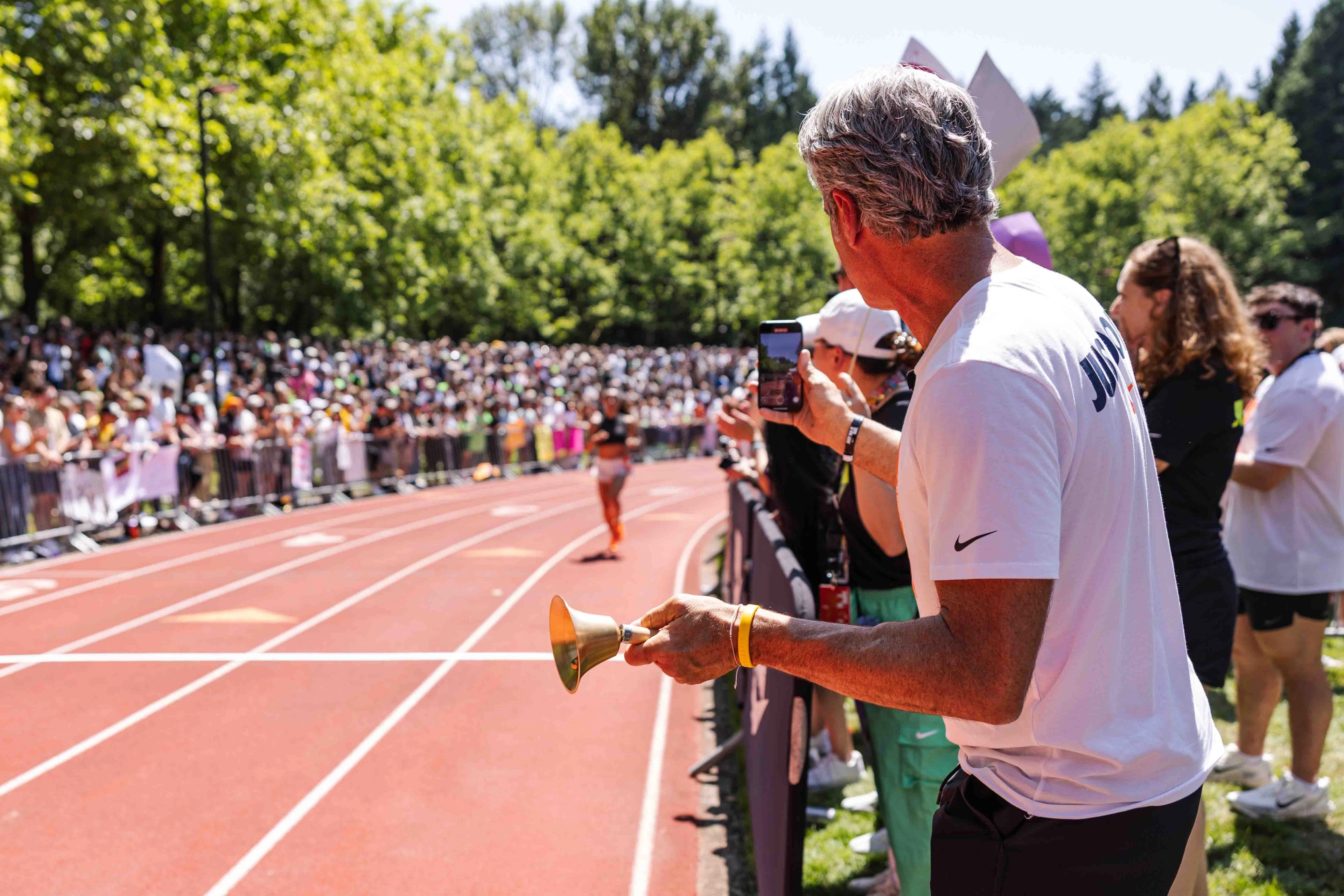One Year In, the CEO of Sport Is Taking Nike Back to Its Roots

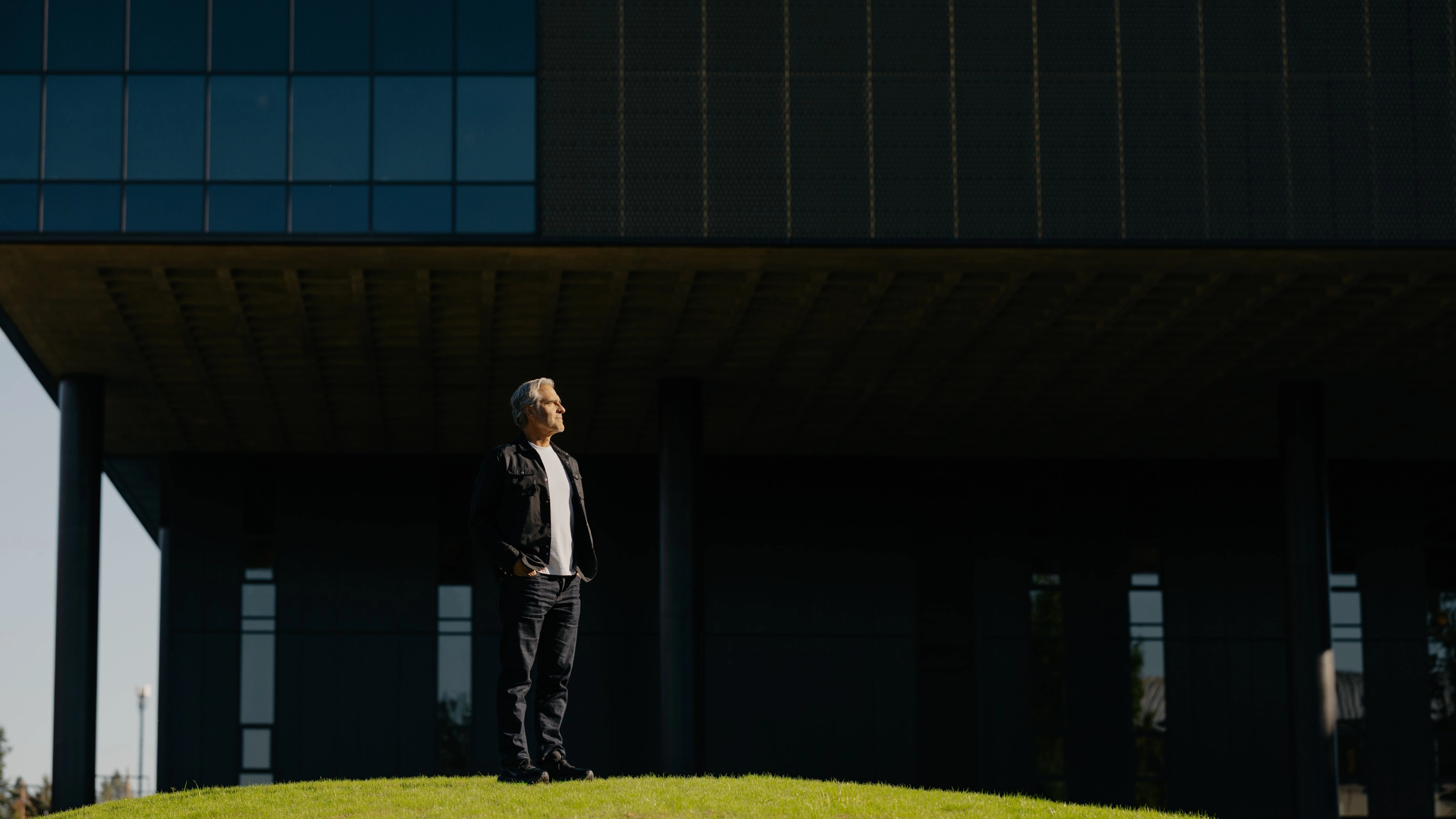
- October 15, 2025
- Words:
At Philip H. Knight Campus, in Beaverton, Oregon, the day doesn’t start at dawn. On this crisp autumn Tuesday morning, employees arrive before the sun, jogging around campus or grinding through reps in the weight room. In Studio 4 of the Nike Sports Center gym, a crew of about 20 are warming up for a 7 a.m. HIIT class.
One of the class-goers is CEO & President Elliott Hill, both regular patron and proselytizer of the campus’s facilities. This morning, he’s front-row, dead-center of class, two dumbbells at his feet. The workout playlist is straight bangers, and Hill is matching the music’s energy and chatting up his neighbors, asking about their Portland Marathon finish times, trying to distract them from the last 10 seconds of a plank. He’s gregarious and in high spirits despite the early hour, as upbeat and encouraging as a cheerleader and coach rolled into one.
After class, an employee takes the opportunity to reintroduce herself. She and Hill had met once before, she explains, while she was working in retail in Louisville, Kentucky. He’d given her some career advice: If she wanted to advance at Nike, she needed to look two jobs ahead, assess what skills were needed, and commit to learning them. Now, 12 years later, she’s a product line manager for Nike Pro training apparel. Hill shakes her hand and says he still stands by that advice — success, in his eyes, is about filling out your toolbox, not just waiting for people to hand you the tools. Both of them are proof of what happens when one does.
“I do celebrate the wins, and I make sure people enjoy them — but I am quick to move to, ‘Okay, what could we have done better?’ Or, ‘Okay, great job. Now, let’s get going, ‘cause we got so much more work to do.”
Elliott Hill, NIKE, Inc. President & CEO
Hill’s time at NIKE, Inc., from intern to company leader, has been so distinctive and remarkable that his career ladder was the rare LinkedIn page to go viral. This October, he’s hit one year in the CEO role. It’s been a good year, in Hill’s eyes — Nike’s shown up for athletes, debuted fresh product, reignited its marketplace relationships — but more than that, it’s been a promising stepping stone. The best is yet to come, Hill says; as much momentum as Nike’s had, he still gives the company a 6 out of 10 for fulfilling its potential. “I do celebrate the wins, and I make sure people enjoy them — but I am quick to move to, ‘Okay, what could we have done better?’ Or, ‘Okay, great job. Now, let's get going, ’cause we got so much more work to do.”
As any CEO would be, Hill is highly attuned to the dogged complaints in recent years that Nike has stopped innovating, and he’s eager to disprove them. He thrives on a challenge, he says, and knows that true innovation is born from tension, not stability. Sitting outside the LeBron James Innovation Center after his HIIT class, he notices two employees walking into the building. He beckons them over — hollers, actually — and asks about their progress working on new cleats. Restoring the pride employees have in the company was important: If they didn’t believe in themselves, no one else would either. “If we're gonna make baseball cleats, make the best baseball cleats,” implores Hill. “If we’re gonna make football cleats, make the best football cleats.” Eager to flex on their work, they invite him to judge it for himself: Alpine conference room, next week. Hill repeats the location and time back to them. It’s a date.
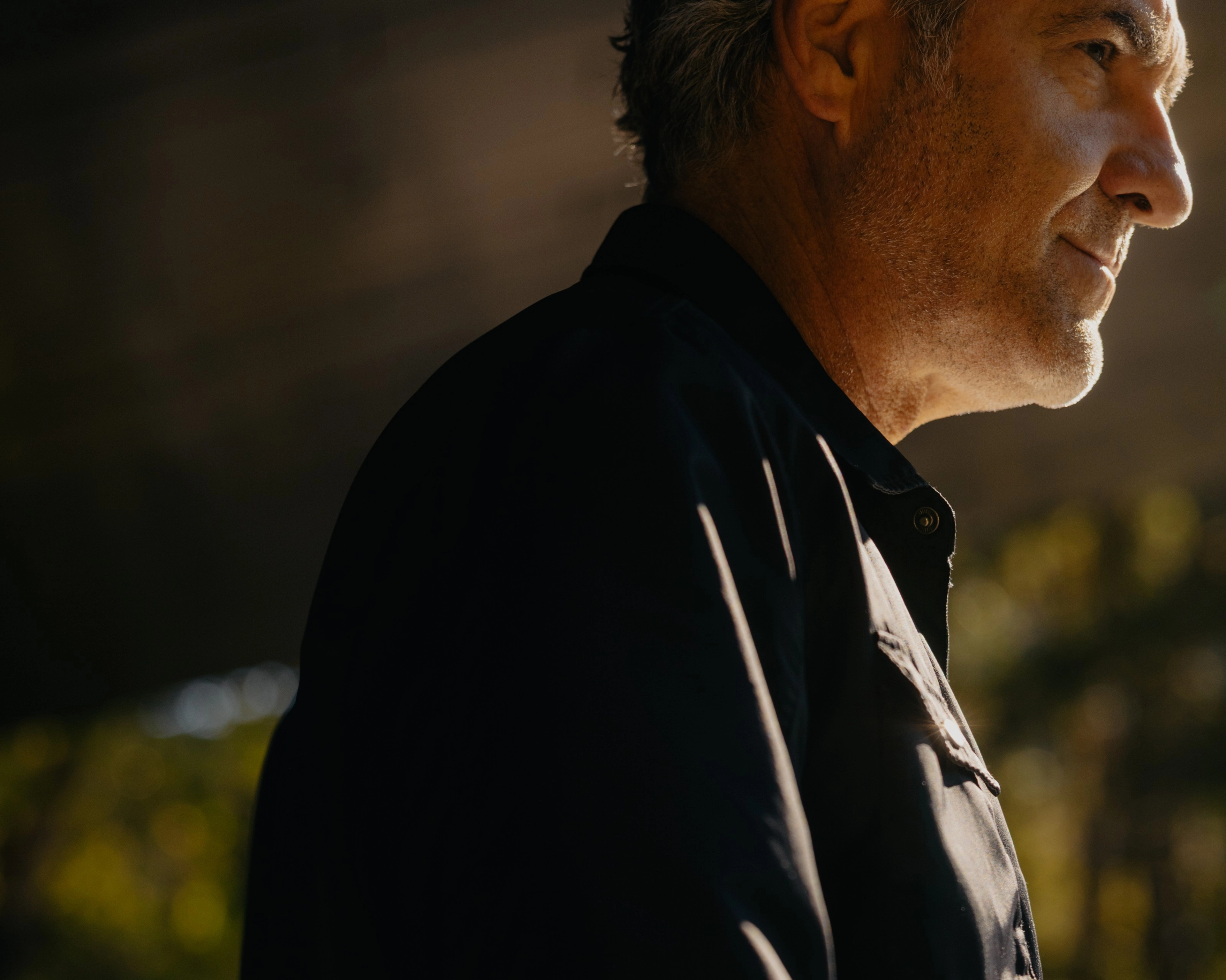
One year in, Hill, 62, has made it his mission to reignite Nike’s reputation as a trailblazing sports company and a leader of innovation — not merely a product company, but an ideas company. And he’s adamant that those ideas be rooted in sport, with athletes at the center. He says he’s bullish for the future, and each day seems to give him a new reason to be. Take today’s employee chat on cleats. “They were so proud to say, ‘Look at what I got coming.’ That’s what I want,” says Hill. For people to not just work hard, but to also have the steely conviction that what they’re making is good, worth bragging about. To know winning is winning together. “I want people to feel a sense of pride in their work, in their craft, in their service to the athlete.”
He sees this charge as a group activity, something to which he holds himself and everyone else at the company accountable. Motivation, for Hill, is something of an extreme sport: He leads with an enthusiasm so contagious, it makes even the naysayers devout. He recruits you into dreaming bigger and better, insisting that winning as a team is the only way to win — while still recognizing and celebrating the team players. It’s the forest and the trees. “The way he makes everybody in the room feel special is just unbelievable,” says Dan Lanning, the head coach of the University of Oregon football team. “I remember walking away from our first interaction, telling my wife, ‘This guy's gonna make it tick.’”
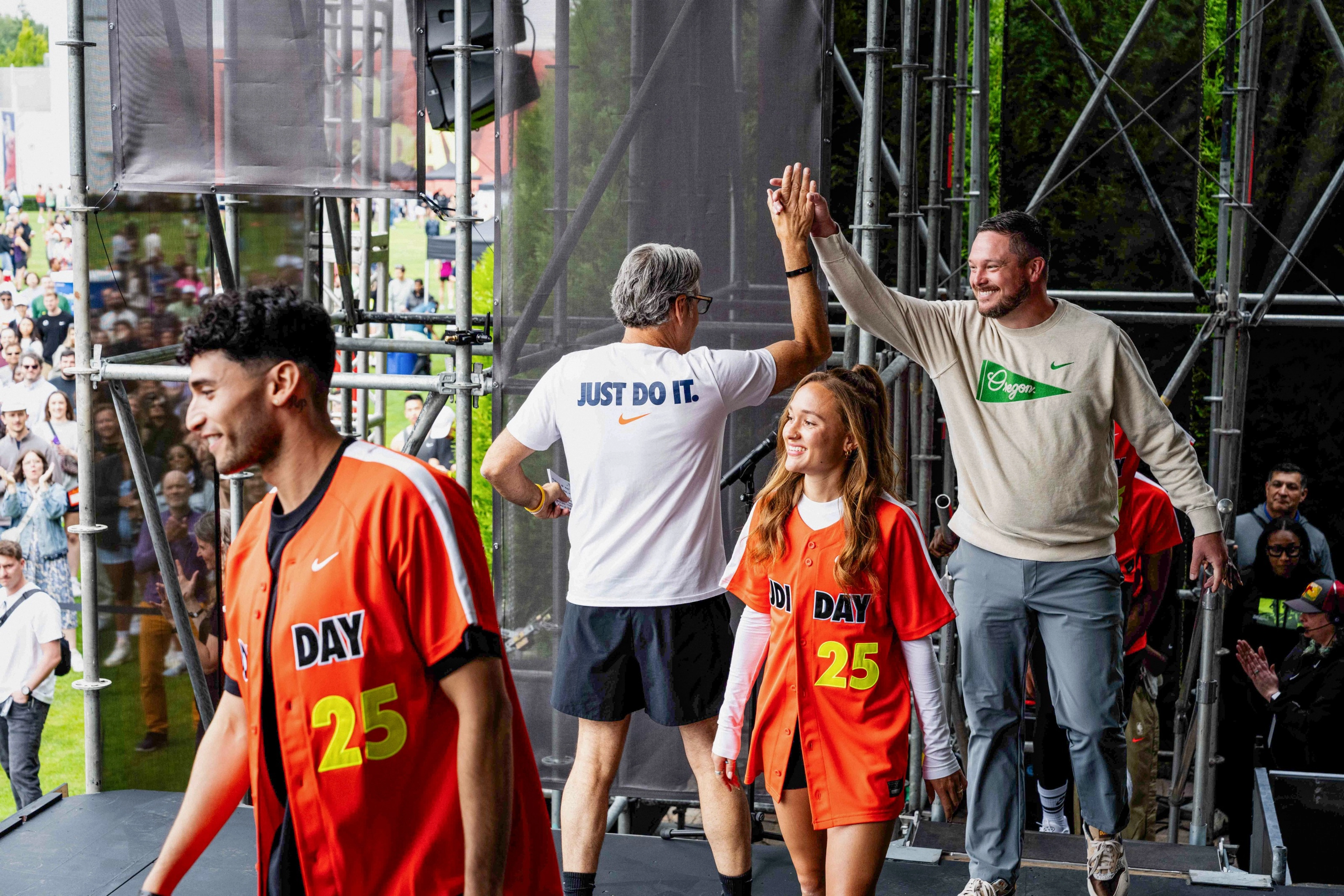
“The way he makes everybody in the room feel special is just unbelievable.”
Dan Lanning, Head Coach, University of Oregon
He brings that same personable attentiveness to Nike athletes. You can’t serve the athlete if you’re not connected to them, and Hill stresses the importance of building genuine relationships. “It’s important to know that we’re watching,” he says, punctuating his words with gentle karate chops atop the table outside the LeBron James Innovation Center. “Great relationships are built on mutual trust and respect, over time, from showing up. So first game, you get in the ring and you want me to go? I’ll be there.”
No need to take his word for it. He picks up his work phone — not to be confused with his personal phone, also on the table, in an identical case — and pulls up a text thread with the New York Liberty’s Sabrina Ionescu. (When a GOAT athlete called him earlier in the morning, it was on his personal line.) The thread is several scrolls long; they’re sending each other photos, Hill is checking in after games. Most of their chatter is about the Sabrina 3, the WNBA player’s latest Nike signature shoe, released earlier this year. He opens a photo from May 17, the day of the Liberty season opener against the Las Vegas Aces. Hill; his wife, Gina; Ionescu; Tom Peddie, GM/VP of North America; and his wife, Sharon, put their feet together, showing off a circle of Nikes. “I really value Elliott’s approach," says Ionescu. "I always feel my voice is being heard when I share with him what is important to me to grow my business. He knows how to connect with people on a human level, and I couldn’t be more grateful for him to be back in the Nike family.”
Hill wants athletes to feel not only seen, but also supported, and certain that they are in good hands. At the Nike Football Summit, in June, Brazilian football legend and 31-year Nike athlete Ronaldo (R9) found himself with the other top footballers of all time: Vinícius Júnior, Kerolin, Didier Drogba, Matheus Cunha, Edgar Davids — plus Hill, who gave them a rousing pep talk. “Elliott giving us a rallying speech on how important we were to the company and how significant our contribution to the team was — it made us feel special, valued and inspired,” says R9.
In Hill’s mind, those feelings needed to cascade to restoring external relationships too. So this past year, he’s been working the phone. Almost immediately after becoming CEO, he called NFL Commissioner Roger Goodell to ensure the extension of Nike’s licensing and uniform deal through 2038. Next up were calls to retail partners like DICK'S Sporting Goods and JD Sports, partnerships that had weakened during the company’s focus on direct-to-consumer. No longer: Those wholesalers, Hill says, are a crucial element not only of sales, but of product feedback. This outreach matters, says Ed Stack, Executive Chairman of DICK’S Sporting Goods and Foot Locker, who’s known Hill for more than 25 years. “Elliott tells it like it is, and his transparency builds trust that fosters a great business relationship," says Stack. "Elliott’s greatest impact to Nike is that Nike now believes it can be Nike again, and I can guarantee that its wholesale partners now share the same belief.”
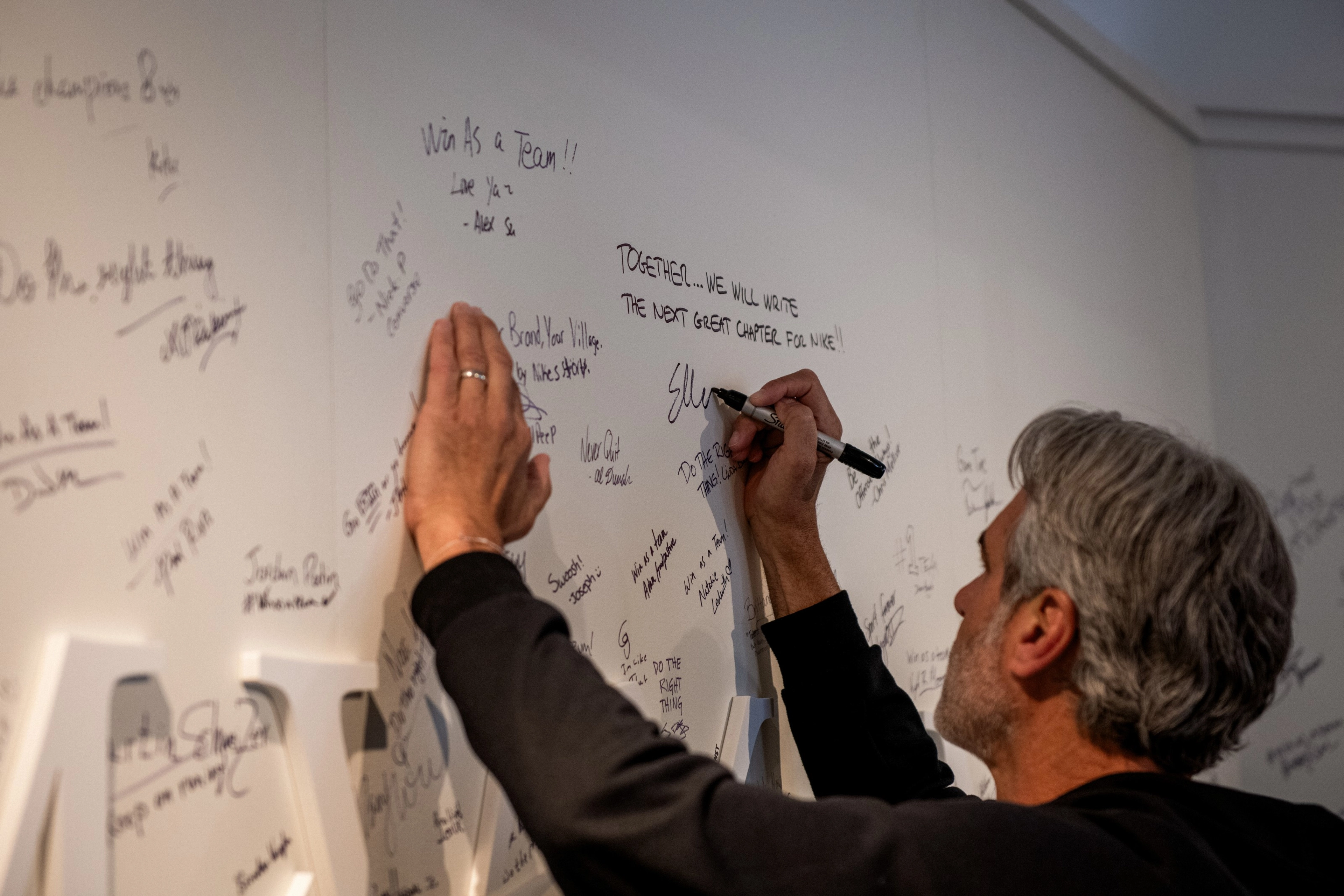
Hill adds a message on the Nike Maxims wall at Steve Prefontaine Hall: “Together...we will write the next great chapter for Nike!!”
Later that morning, Hill walks around campus, pointing out changes he’s implemented. Coming out of a 2020 retirement to take the helm last year, he says he knew employees needed a cultural change. To feel it, he thought, they needed to see it. He got the fountain that runs along the Sebastian Coe building turned back on, “because it signals that the water’s running, that we’re back in our flow.” Company adages have been turned tangible: giant-letter installations of Nike Maxims like “DO THE RIGHT THING” and “WIN AS A TEAM” are displayed throughout campus, as well as a sleek digital clock that counts down to major sports events like the 2026 Winter Olympics and the World Cup. Sport is always imminent, and Hill doesn’t want employees to forget that. Any second of any day, athletes are somewhere training. Cities are preparing. Fans are anticipating. “We gotta get focused, so we’re always preparing ourselves,” he says.
All change has to start from within, and one of Hill’s primary focuses has been establishing a fresh senior leadership team, many of whom are NIKE, Inc. veterans. Most notably, Hill’s restructured the company to organize by sport (running, basketball, global football and more), instead of by women’s, men’s and kids. The reorganization and strategy reset — the “Sport Offense” — allows teams to garner specific insights about athletes and use them to drive innovation and storytelling. “We have small teams who are, in each of those segments, trying to understand their core consumer,” says Hill, pointing out the difference, say, between where a Nike basketball consumer shops and where a Jordan one does. “That’s a way to take $47 billion of revenue, break it down by sport, and then hold each of those sports responsible for revenue, margin and market share.”
Hill moves briskly, even after the vigorous class, equal parts anticipation of what’s to come and satisfaction with what’s come so far, fueled by passion and the overnight oats he packed himself for post-workout. One of his proudest campus accomplishments, he says, has been getting more people in the company gyms. It isn’t uncommon for employees, on their way to a meeting or taking a kombucha break, to run into Hill, who is likely to encourage them to get a workout in. When he started as CEO, he realized that the company’s state-of-the-art gym facilities were largely empty, in part because employees weren’t allowed to bring their children. He invited families in and started working on bringing back extracurriculars for kids, like the erstwhile swim program and intramural sports. With his push, the gyms are filling back up. Case in point: That morning, before class, he walked through rows of treadmills and barbell and weight spaces, in use. Nike’s ethos doesn‘t end with the consumer: Sport should propel the lives of employees too.
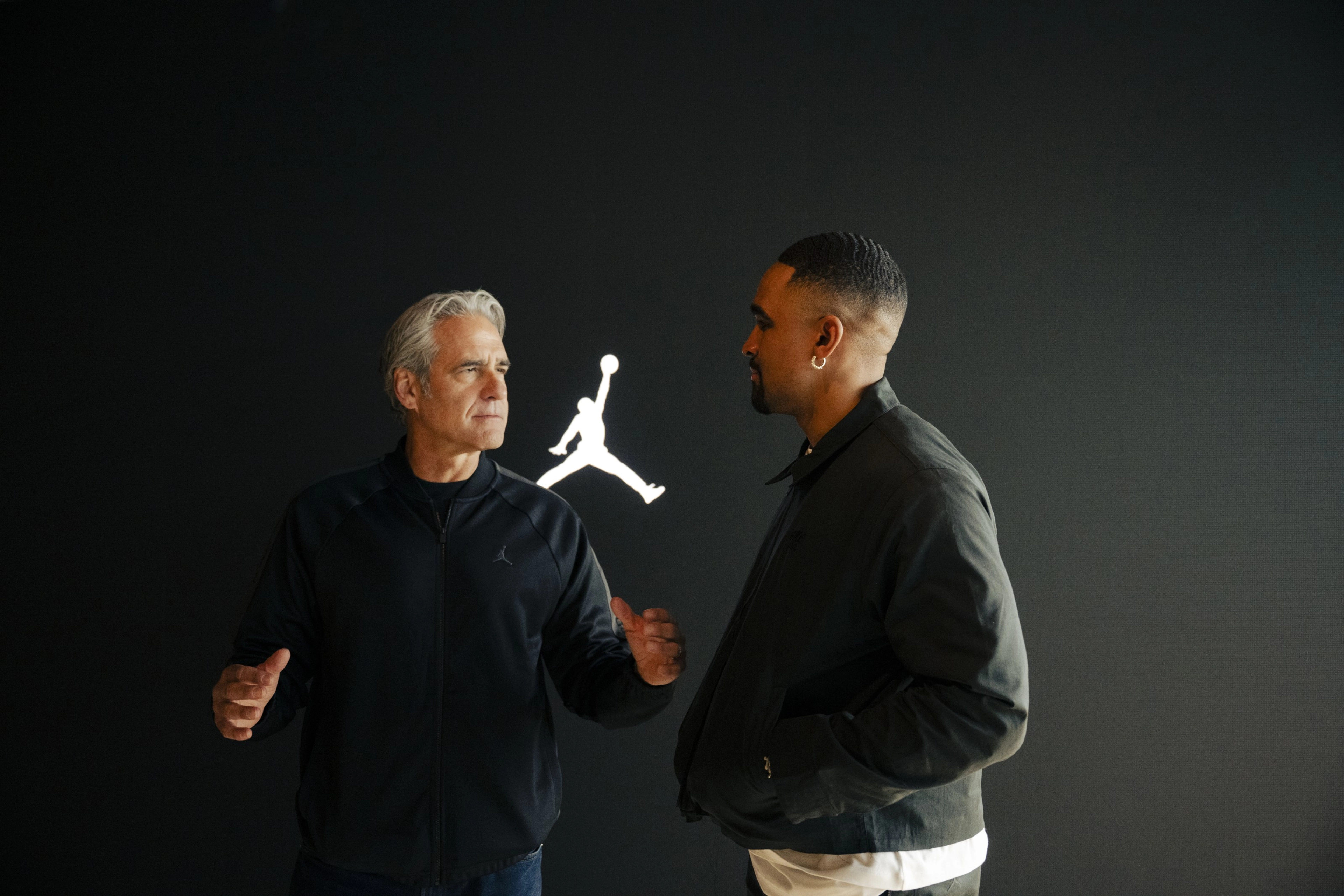
Hill with Jordan Brand athlete Jalen Hurts; last winter, NIKE, Inc. paid the quarterback‘s fine for wearing mismatched Jordan 11 cleats on field, an example Hill cited of "Nike being Nike" again.
“He’s just so open and approachable that people of all levels feel like they can reach out to him.”
Gina Hill, Elliott’s wife of 32 years
For his part, Hill is an avid bicyclist and hiker, says his wife, Gina — but really, he’s a fanatic about any sort of dynamic movement, be it bobsledding or tai chi. “He’s super curious, and he’s an open book: I’m vulnerable, maybe I won’t succeed at this, but I’m going to give it a shot,” she says. “Which is a great model for the greater Nike group, not being afraid to try new things and not being afraid to ask questions.”
Hill and Gina — who met at Nike — usually spend their mornings working out together, but today's HIIT class was a particularly special occasion. It was Gina’s first day cleared to go back to exercise after remission. This past April, six months into his tenure, Hill got a phone call he’ll never forget: Gina had breast cancer. Hill was in New York and was due to meet with investors in 10 minutes. He informed the two leaders he was with; he cried. “Then you wipe your eyes and go and get your shit together,” says Hill. Both he and Gina aren’t ones to dwell or ruminate; they are doers, people of action. “We are big believers in control what you can control and try not to waste energy on the stuff that you can’t control,” he says. Gina had a double mastectomy, and Hill was by her side, driving her to appointments and procedures. Creating a culture where that balance can and should happen is a point of pride, says Hill. “I think it’s good for the boss to say, ‘You know what, I’m going to go take care of my wife. You guys get out there and roll.’”
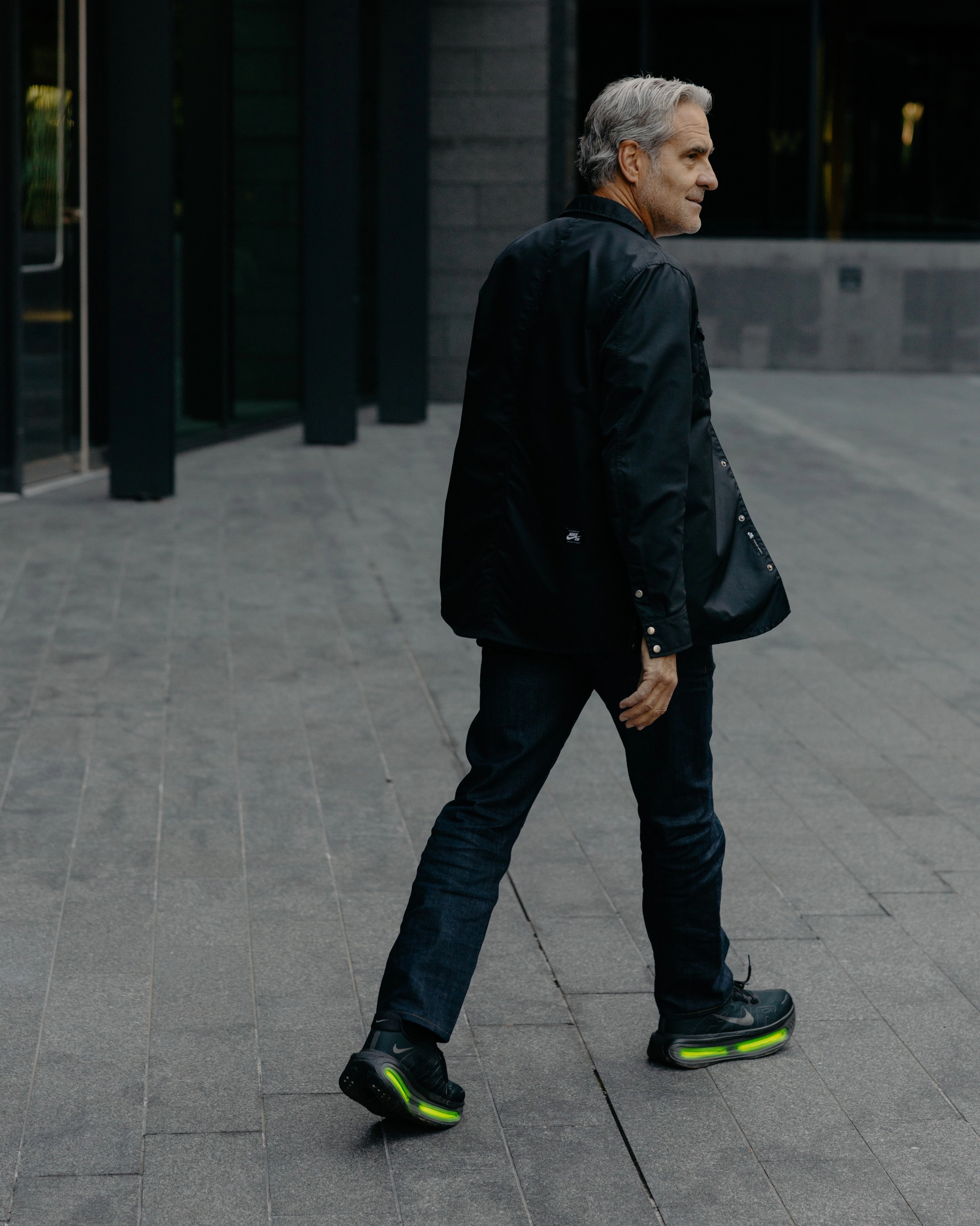
Hill wears the Nike Vomero Premium in Black/Volt
“I don’t want to be stereotypical, and I probably go to the extreme to break that — making fun of myself to get people to be able to connect with me on a personal level.”
Elliott Hill, NIKE, Inc. President & CEO
Hill doesn‘t have the typical CEO pedigree. He grew up in a “blue collar, hard-working, culturally and racially diverse” neighborhood in Austin, Texas, a latchkey kid with a single mother who was school teacher. Before Nike, he graduated from Texas Christian University with a degree in kinesiology. “I don't want to be stereotypical, and I probably go to the extreme to break that — making fun of myself to get people to be able to connect with me on a personal level,” he says, sipping from a cup of black coffee. (Once, he offered to shave his head if his team made budget for that fiscal year — and when it happened, he fulfilled his end of the bargain on a stage in front of them.)
The method works: Gina says her husband is particularly attuned to making people feel comfortable, which comes from his bottomless curiosity. “He’s just so open and so approachable that people of all levels feel like they can reach out to him.”
Growing up, sport was a way to shake the stigma of being the kid in the neighborhood without a dad. “I always felt like I had something to prove to everybody, and that gets ingrained in your head,” he says. He became an overachiever: student class president, president of his fraternity, Phi Delta Theta. “I was always the guy who was pushing myself, not just in sports.” That competitive nature shepherded him through increasingly senior roles at Nike, and, along the way, his tenure dictated the course of his life.
Including his second start. Even after four years of active retirement, Hill knew he wasn’t completely out of the Nike game. He’d kept busy, serving as a business consultant and launching the Travis County Parks Foundation, a nonprofit organization that supports parks in Austin, Texas. But his attention to the brand persisted, a mental muscle memory. He couldn’t help himself from noting which brand of sneakers he’d see on people walking down the street. “Even when we were traveling for fun, he was like, ‘Do you mind if we just walk through the Foot Locker and see what’s going on?” recalls Gina.

“I’m meant to grind. I’m meant to work. I’m meant to be part of a team, hopefully competing. And not just competing — winning.”
Elliott Hill, NIKE, Inc. President & CEO
Which might be why his return has been so smooth. Retirement was nice, but: “I’m meant to grind. I’m meant to work,” he says. “I’m meant to be part of a team, hopefully competing. And not just competing — winning.”
The task ahead — reestablishing the brand’s cultural and market dominance — only excites him. It also keeps him quite busy: After he wraps up this interview, outside Nike’s building dedicated to innovation, Hill’s off to the Department of Nike Archives, a repository of more than five decades of company history. There, he’ll look through a curated exhibit of Nike’s presence at the Los Angeles 1984 Olympics — the sporting event that put Nike on the map — and get inspiration for how the brand can come out in force for LA28. He’s the type of leader that knows you can’t get where you’re going unless you know where you’ve been. The past unlocks the future. Hill’s got the key.
